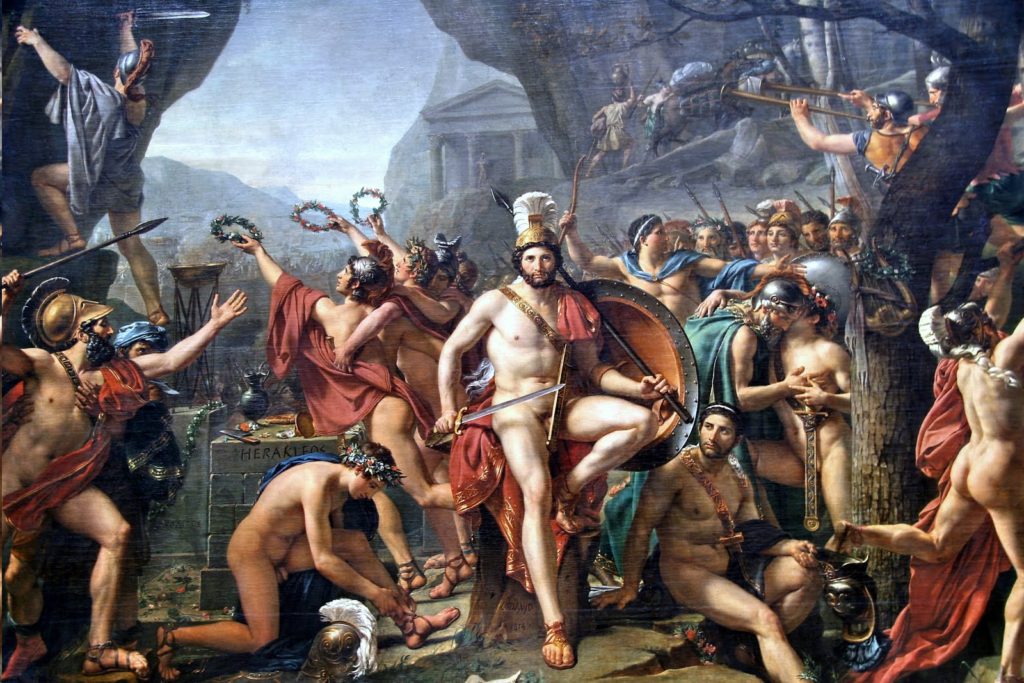The 5th century B.C. Greek historian Herodotus records an interesting story about Aristodemos, the one Spartan who survived the battle of Thermopylae. It’s the sort of thing that could make some great PC backstory.
Quick background: the Battle of Thermopylae, best known these days from the movie 300, was a three-day battle fought in 480 B.C. between the army of Persian emperor Xerxes I and forces led by King Leonidas of Sparta, representing an alliance of Greek city-states. Force sizes are hard to estimate from ancient texts, but the Greeks were probably outnumbered twenty to one, or some figure in that neighborhood. Though Leonidas dismissed the bulk of the Greek forces when it was clear the battle was lost, the Spartan contingent – proud product of a blood-mad warrior society – remained to form the core of the rear guard. They were all killed. The battle has resonated through the Western canon, helped along by a remarkable retelling in Herodotus, as an inspirational story of brave men sacrificing all on the altar of freedom.

But not quite all the Spartans at Thermopylae were killed. Herodotus tells us of two Spartans who were kept away from the battle by forces outside their control. Aristodemos and Eurytos were sent away from the battle either because they were relaying messages or were afflicted by an eye disease (Herodotus gives both accounts). Eurytos gives forth extra effort to join the battle, either hurrying back from giving his message so as to make the battle and die beside his comrades, or leaving his sickbed to quite literally rush blindly into the fray. Aristodemos either dallies on the road or declines to leave his sickbed, and so survives the battle.
It doesn’t go well for Aristodemos.
“After returning to [Sparta], Aristodemos met with disgrace and dishonor. The dishonor he suffered was that not a single Spartan would give him fire or speak to him, and his disgrace was that he was called ‘Aristodemos the Trembler’.” (Herodotus 7:231)
Next year, at the battle of Plataea, Aristodemos redeemed himself, but not fully.
“In my opinion, the man who proved the best and bravest by far was Aristodemos, the only one of the 300 to have survived Thermopylae, for which he had met with disgrace and dishonor. After him, the best were the Spartans Poseidonios, Philokyon, and Amompharetos. When the discussion of which man had proven himself the best came up for discussion, however, the surviving Spartans recognized that Aristodemos had wanted to die in front of everyone because of the charge against him, and so had left his post in a rage and displayed great feats, while Poseidonios did not want to die, but proved himself a noble and courageous man all the same, and was therefore much the better man for it. But perhaps it was jealousy that motivated them to render this judgement. Of those who died in this battle, all the men I have listed except for Aristodemos were awarded official honors, while Aristodemos was not because he wanted to die for the reason I have just mentioned.” (Herodotus 9:71)
As an interesting aside, Herodotus speculates that if Eurytos hadn’t died, Aristodemos wouldn’t have looked so bad by comparison and might not have been reviled. His countrymen might have simply shrugged and said, “I guess there was nothing you could have done.” But that’s neither here nor there.
Aristodemos is great fodder for PC backgrounds! Rather than playing Aristodemos, play Aristodemos’ child. Many settings have proud warrior races/cultures/traditions, from Klingons to Cimmerians to Solamnics. If you’re looking to make a PC from such a background who has something to prove or is an outsider in her own culture, having her be the child of an NPC you model on Aristodemos would provide all the justification you need. Also decide whether you want your Aristodemos-analogue to have ‘redeemed’ himself on a battlefield like Plataea. If he never had the opportunity to redeem himself, he’ll be even more despised. But if he did redeem himself, your character could feel insulted that her father wasn’t accorded the proper honors for his heroism at Plataea-analogue. Both ways have merit.






